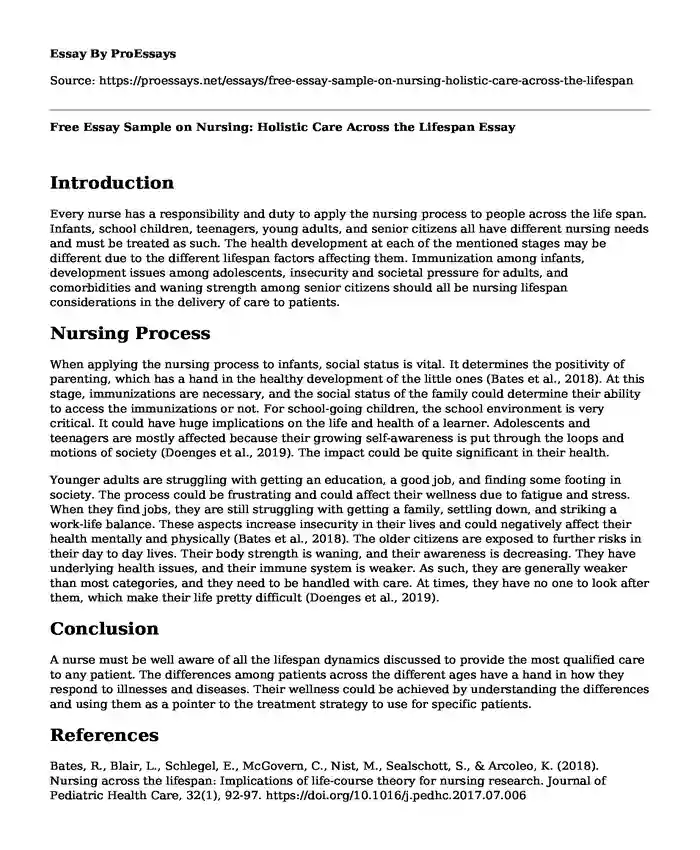Introduction
Every nurse has a responsibility and duty to apply the nursing process to people across the life span. Infants, school children, teenagers, young adults, and senior citizens all have different nursing needs and must be treated as such. The health development at each of the mentioned stages may be different due to the different lifespan factors affecting them. Immunization among infants, development issues among adolescents, insecurity and societal pressure for adults, and comorbidities and waning strength among senior citizens should all be nursing lifespan considerations in the delivery of care to patients.
Nursing Process
When applying the nursing process to infants, social status is vital. It determines the positivity of parenting, which has a hand in the healthy development of the little ones (Bates et al., 2018). At this stage, immunizations are necessary, and the social status of the family could determine their ability to access the immunizations or not. For school-going children, the school environment is very critical. It could have huge implications on the life and health of a learner. Adolescents and teenagers are mostly affected because their growing self-awareness is put through the loops and motions of society (Doenges et al., 2019). The impact could be quite significant in their health.
Younger adults are struggling with getting an education, a good job, and finding some footing in society. The process could be frustrating and could affect their wellness due to fatigue and stress. When they find jobs, they are still struggling with getting a family, settling down, and striking a work-life balance. These aspects increase insecurity in their lives and could negatively affect their health mentally and physically (Bates et al., 2018). The older citizens are exposed to further risks in their day to day lives. Their body strength is waning, and their awareness is decreasing. They have underlying health issues, and their immune system is weaker. As such, they are generally weaker than most categories, and they need to be handled with care. At times, they have no one to look after them, which make their life pretty difficult (Doenges et al., 2019).
Conclusion
A nurse must be well aware of all the lifespan dynamics discussed to provide the most qualified care to any patient. The differences among patients across the different ages have a hand in how they respond to illnesses and diseases. Their wellness could be achieved by understanding the differences and using them as a pointer to the treatment strategy to use for specific patients.
References
Bates, R., Blair, L., Schlegel, E., McGovern, C., Nist, M., Sealschott, S., & Arcoleo, K. (2018). Nursing across the lifespan: Implications of life-course theory for nursing research. Journal of Pediatric Health Care, 32(1), 92-97. https://doi.org/10.1016/j.pedhc.2017.07.006
Doenges, M. E., Moorhouse, M. F., & Murr, A. C. (2019). Nursing care plans: Guidelines for individualizing client care across the life span. FA Davis.
Cite this page
Free Essay Sample on Nursing: Holistic Care Across the Lifespan. (2023, Nov 06). Retrieved from https://proessays.net/essays/free-essay-sample-on-nursing-holistic-care-across-the-lifespan
If you are the original author of this essay and no longer wish to have it published on the ProEssays website, please click below to request its removal:
- Analysis of a Health Campaign Message for Tuberculosis
- Alzheimer in HBO Documentaries Paper Example
- Supplemental Nutrition Programs Essay Example
- Essay Sample on Canadian Male Streets Skinheads: Street Gangs or Street Terrorists
- Essay Example on Can Diet Strengthen Immune System & Prevent Illness?
- Essay Sample on Immigrants: Impacting the US Economy in Small and Large Scale Businesses
- Research Paper on Intersectionality: Examining Multivariate Power Factors for Equal Health Outcomes







